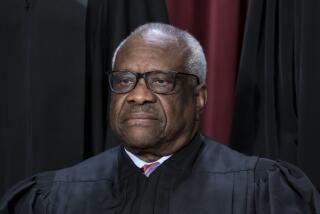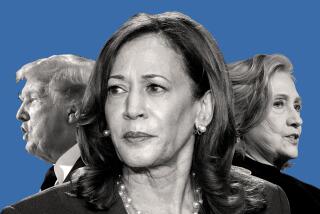Clash Between Thomas, Accuser May Be Settled on TV : Media: Decisive factor is likely to be the public’s perception of who is more believable. Prof. Hill’s credibility on video gave impetus to charges.
WASHINGTON — In the end, the future of Clarence Thomas will come down to his word against that of Anita Faye Hill.
It may be impossible to prove who is telling the truth, the Supreme Court justice-designate or the Oklahoma law professor whose allegations of sexual harassment led to postponement of the Senate vote on Thomas’ nomination.
But, in an age in which character is the dominant political currency, the decisive factor probably will be the American public’s gut judgment about which of these two comes across on television as more believeable.
So far, Hill has proven to be a credible personality on live television. Seemingly compelled by the media to speak and frustrated by a Senate that Americans are prone to perceive as an insensitive ol’ boys’ club, Hill transformed shadowy allegations into a political furor.
Had the allegations surfaced in the normal channels of the Judiciary Committee, many now believe, they would not have had such political impact.
Over the next few days, both sides probably will try to portray themselves in the press through a parade of character witnesses, corroborating evidence and personal disclosure to win the second and far more difficult struggle for that most powerful modern political currency, public believability.
“The case for Clarence Thomas has not been made on his intellect or his judicial record,” said Kathleen Hall Jamieson, dean of the school of communication at the University of Pennsylvania. “It has been made on the strength of his character, molded by interesting circumstances.”
She said that now “personal credibility is what is at issue.”
Hill alleges that Thomas sexually harassed her when he was her superior at the Education Department and later at the Equal Employment Opportunity Commission in the 1980s. The charges surfaced over the weekend when an FBI report on the allegations was leaked to National Public Radio and Newsday, the Long Island, N.Y., newspaper.
Those reports were swiftly denounced by the White House on Sunday. By Monday, the story seemed to be hanging in the balance, a second-hand account, already denied, made by an unseen woman late in the game.
But everything changed when Hill faced the American public, appearing on television at midday Monday. “I don’t know if anyone is giving the White House or the Senate competent guidance, but someone clearly gave her good press advice: ‘You’re going to be considered a harlot forever unless you stand up and tell your story,’ ” said Michael D. McCurry, a Democratic media specialist.
Hill answered every question that the press asked her during 45 live minutes on CNN that was watched in nearly every office in Washington. Political analysts said she appeared sincere, dignified and serious and spoke with some emotion.
McCurry was even struck by the site of Hill’s appearance: “ . . . in a classroom surrounded by her students and . . . colleagues, with the law school dean credentialing her in the introduction.”
“There is still no evidence, definitively one way or the other . . . but it became a serious charge the instant she came on TV,” said William Schneider, a political analyst at the American Enterprise Institute.
Jamieson believes that several factors are giving momentum to Hill’s story.
One is that Hill’s background is almost identical to Thomas’, a person of modest circumstances who worked hard, attended Yale Law School and accomplished much in a short time. Both are black, so the issue could not be reduced to race.
And she seemingly has no ax to grind, Jamieson said, because “this was (publicly) disclosed by the others coming to her,” first the Senate staff and later the press.
“So she does not appear to be acting in the stereotype of the vengeful spurned woman, which would have been the other typical scenario here,” Jamieson said.
The allegations are further propelled, Jamieson believes, by the implicit “charges that the Senate is a good ol’ boy structure that doesn’t care about sexual harassment.”
Indeed, in the arena of politics, even if the Senate had pursued the story rather than dropping it, it would have had to proceed gingerly. Now, however, it can be more aggressive so as not to appear sexist, many believe.
What most expect now is that both sides will offer character witnesses, evidence to prove the other a liar, and a carefully staged performance by senators and by Hill and Thomas.
“It will be a maudlin display,” said Larry Sabato, a University of Virginia political scientist. “That is all you can say with assurance. A soap opera, made for TV.”
Ultimately, Thomas may have to go before the cameras himself to plead his case for credibility, Sabato and Schneider suggested.
“That is where the Republicans have a problem,” Schneider said. “The White House says you have to prove these allegations beyond a reasonable doubt. No. This is not a criminal trial. All you have to do is create a reasonable doubt,” and then senators may not feel compelled to support him, he said.
More to Read
Sign up for Essential California
The most important California stories and recommendations in your inbox every morning.
You may occasionally receive promotional content from the Los Angeles Times.










